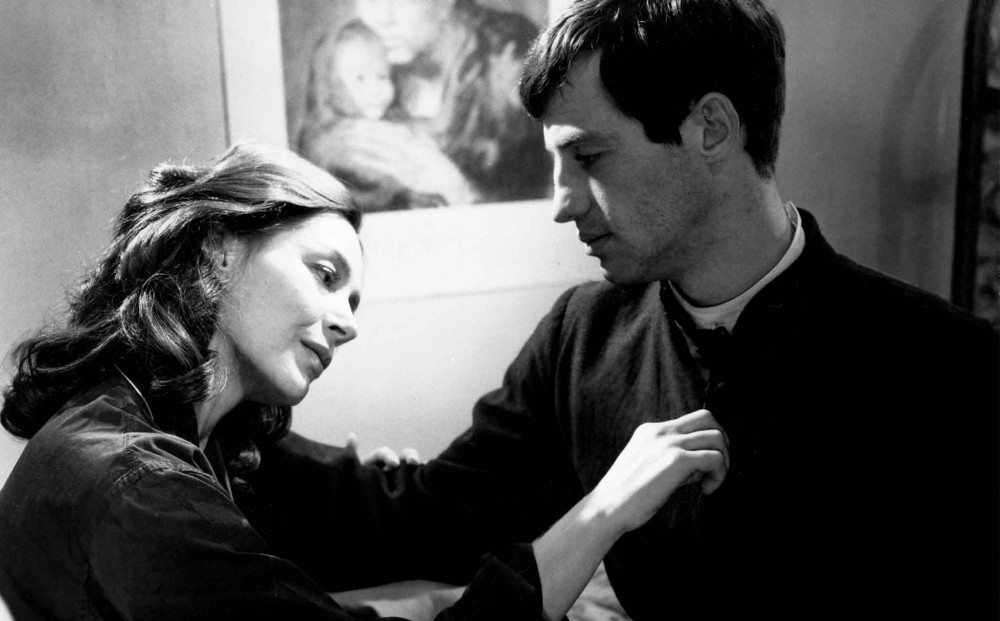Jean-Pierre Melville’s
LÉON MORIN, PRIEST
12:50 6:20
FINAL DAY! MUST END TODAY!
Directed by JEAN-PIERRE MELVILLE
Starring JEAN-PAUL BELMONDO and EMMANUELLE RIVA
U.S. PREMIERE OF THE COMPLETE DIRECTOR’S CUT
NEW 4K RESTORATION
(1961) “Religion is the opiate of the people,” begins the confession of Communist widow Emmanuelle Riva (the late star of Resnais’ Hiroshima, Mon Amour), provocative just to get some fun in the drab little village where she’s been relocated during the Occupation. But when her confessor dryly replies “Pas exactement,” she begins a seemingly inexorable turn towards God – or towards her handsome confessor Père Jean-Paul Belmondo (in “an erotically charged performance” – BFI) Fed up with being “an auteur maudit known only to a handful of crazy film buffs,” Jewish atheist Melville accepted an offer of real stars and an actual budget to adapt Beatrix Beck’s autobiographical novel, a book he already considered “the most accurate picture I have read of life under the Occupation,” then had to talk an initially reluctant Belmondo – hot from Breathless – into taking the title role. Melville created a kind of fresco of the Occupation – play-it-safe baptisms of Communist and Jewish children; parades of Alpine-hatted Italian Bersaglieri and marching band Nazis; arguments with pro-Pétain and anti-Semitic co-workers; a Jewish colleague getting a shave, name change, and a ticket out; platonic same-sex crushes in a man-less world – but its center is Riva’s confusing, fascinating, tantalizing encounter with God and his servant Belmondo (successfully intellectual, sincere, and ultimately enigmatic in a change-of-pace role), their mutual underplaying making even theological discussions subtly throbbing with emotional undertones. Shot by the great Henri Decaë (The 400 Blows, Elevator to the Gallows, Bob Le Flambeur, Le Cercle Rouge). This restoration of Melville’s never-before-seen director’s cut puts back 11 minutes excised from the original release version. 4K DCP restoration. Approx. 130 min.
A RIALTO PICTURES RELEASE
Reviews
“A gripping movie, and also a great one.”
– J. Hoberman, The New York Times. Read the full piece here.
“Riva’s portrait of a Communist office worker and single mother striving to maintain her own integrity and her daughter’s safety provides the film with a startling cumulative force… [Melville] instinctively uses cinematic and dramatic means to take us into literary sensibilities. Melville’s images are cathartic because his vision is both pitiless and tender.”
– Michael Sragow, Film Comment. Read the full piece here.
“DESERVES REDISCOVERY. Léon Morin, Priest is another reason to remember and honor [Emmanuelle Riva], in addition to its merits as an intellectually and artistically stimulating film.”
– Eric Monder, Film Journal International
“Melville’s depiction of wartime France is peerless: he shows the brazenness of collaborators, the casual anti-Semitism, and the arrests and disappearances with a harrowing simplicity... Melville films the religious dialectics with remarkable but dispassionate skill, and he uses the story of Barny and Morin to skew the postwar political context—to reinforce the role of Catholics in the newly founded Fifth Republic and suppress that of Communists.”
– Richard Brody, The New Yorker
“Twitches with the feuds and the frictions, great and small, that beset a French provincial town during the war... Even if you know and love this masterly movie — the first and last occasion, for Melville, in which a female character takes center stage — seek it out afresh at Film Forum, where eleven minutes of additional footage have been restored, most of it overtly concerned with the ethical agonies of occupation.”
– Anthony Lane, The New Yorker
“EXTRAORDINARY…STRANGE, OFTEN THRILLING, ALWAYS SURPRISING... Melville’s eye for exacting detail here is expected. What is remarkable is the depth of feeling he exacts from the juxtaposition of ordinary moments with their extraordinary context. When Melville cuts to some Resistance fighters leaving the baptism and returning to the woods that shelter them, it’s as if you were watching fathers leaving for that day’s work… Belmondo brings a shock of the carnal to every encounter. The world of Léon Morin is one of profound disarray.”
– Manohla Dargis, The New York Times
“Miraculous cinema, even for heretics! Melville’s extraordinary excursion into Bressonian territory… With an extreme emotional intensity, he forges links between the disparate themes of the Occupation, profane love, and spiritual quest.”
– Time Out (London)
“Melville’s casting of Belmondo was a piece of counterintuitive genius: having established himself as a supremely ironical performer in Godard’s Breathless, here he is asked to portray a paragon of sincerity. It’s a remarkable performance.”
– Glenn Kenny
“Expresses the genuine eye of the visionary… Apart from Bresson, it is hard to think of anyone else now who can give the physical world such a charge.”
– Penelope Gilliatt, The Observer
“MELVILLE’S MASTERPIECE! A GIDDY BIT OF BLASPHEMY! Belmondo is a broken-nosed devil in disguise. A lacerating chamber piece…the fate of the world seems to hang on every word.”
– Keith Uhlich, Time Out
“DON’T MISS! Further establishes Melville as the last to be discovered and appreciated giant of the French New Wave of the 50s and 60s.”
– Andrew Sarris, The New York Observer
“EXTRAORDINARY! MELVILLE’S FINEST! Ingmar Bergman territory but with a clearer sociological focus. Not mere blasphemous farce but an astonishing parade of human nature – Left Bank style. Belmondo makes the comeliest cleric since Montgomery Clift in Hitchcock’s I Confess, yet it’s a performance of compelling restraint.”
– Armond White, New York Press
“HYPNOTIC! BEAUTIFULLY FILMED AND ACTED! A distillation of the themes of devotion and human persistence that mark Melville’s work.”
– New York Magazine
“A movie that moves with the diamond-cut precision and carefully constricting tension of Melville’s trademark gangland sagas, the precious booty here being nothing less than the human soul, the price for an errant gestures the retribution of an even more fearsome underworld.”
– Scott Foundas, The Village Voice

